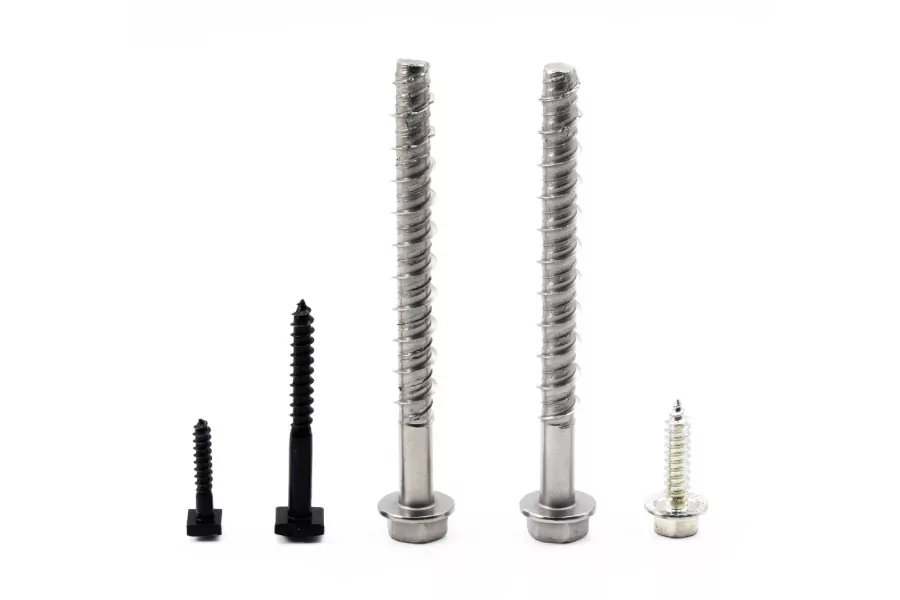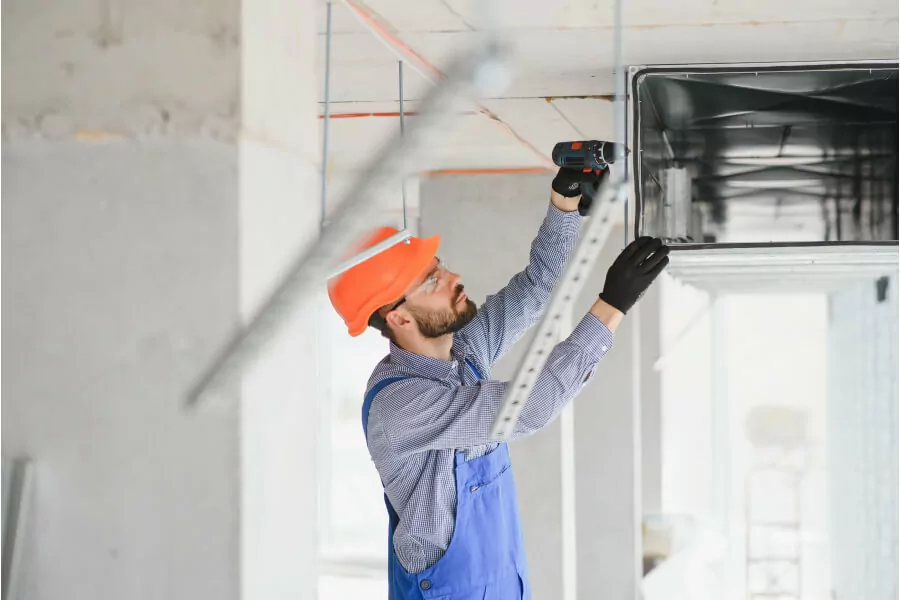
Comprehensive Guide To Concrete Screws
- Concrete Screws
In the world of construction and manufacturing, the importance of concrete screws cannot be overstated. These small but mighty components play a crucial role in ensuring the stability and durability of various structures. From buildings to bridges, concrete screws are essential in holding things together, literally.
Table of Contents
What are Concrete Screws?
Screws designed for concrete are specialized anchoring devices that securely fasten items into masonry materials such as concrete, mortar joints, brick, and concrete blocks. These screws are typically made from materials resistant to corrosion and can be chosen for their fire and seismic resistance.
Different types of heads are available for concrete screws, including hex heads, flatheads, and pan heads. Hex head screws provide a more secure tightening, while flathead and pan head screws offer a flush attachment against the material they’re fastening. This makes them ideal for specific uses, such as securing channels directly to ceilings for installations of pipes or ventilation systems.
How Are Concrete Screws Different from Other Screws?
Concrete screws are uniquely designed to cater to the specific needs of masonry applications, setting them apart from other types of screws.The primary difference lies in their composition. Concrete screws are typically made from corrosion-resistant materials, such as stainless steel or coated carbon steel, to withstand the harsh conditions of concrete and masonry environments. This is unlike wood screws, for example, which may not have the same level of corrosion resistance.
Another distinguishing feature of concrete screws is their thread design. They have high-low threads, where the high thread is sharp and deeply cut to allow for maximum holding power in the base material, while the low thread provides stability. This is in contrast to wood screws, which have a uniform thread design.
Concrete screws are also available with different head types, such as hex heads, flatheads, and pan heads, each serving a specific purpose. For instance, hex head screws offer firmer tightening, making them ideal for heavy-duty applications.They can also be specified for fire and seismic resistance, a feature not commonly found in other screw types. This makes them a preferred choice for construction projects where safety and durability are paramount.

When to Use Concrete Screw Anchors
Concrete screw anchors are incredibly versatile and can be used in a variety of scenarios. They are particularly suitable for dynamic loading situations where the load changes frequently or suddenly. This includes securing machinery, mounting rails, installing shelving, and attaching structural elements in both indoor and outdoor settings.
- Securing Machinery: Concrete screws are often used to secure heavy machinery to concrete floors in factories and workshops.
- Mounting Rails: In construction, they are used to mount rails or tracks to concrete walls or floors.
- Installing Shelving: In both residential and commercial settings, concrete screws can be used to install shelving units to concrete walls.
- Attaching Structural Elements: They are also used to attach structural elements such as beams and columns in buildings.
- Fixing Outdoor Structures: Concrete screws are suitable for fixing outdoor structures like fences, decks, and pergolas to concrete surfaces.
- Securing Safety Barriers: In public spaces, they are used to secure safety barriers and bollards to concrete surfaces.

Understanding Cracked and Non-Cracked Concrete
One of the frequently encountered inquiries in the realm of construction pertains to the selection of the appropriate anchor for specific types of concrete. Concrete is typically classified into two categories: ‘cracked’ and ‘non-cracked’.
- Non-Cracked Concrete: This refers to concrete areas subjected to compressive loads, such as walls or columns. These zones are generally considered non-cracked, implying that the likelihood of crack formation post-installation is relatively low.
- Cracked Concrete: Conversely, areas exposed to tensile loads, like the lower sections of ceilings, are deemed to be cracked. Over time, these zones may exhibit crack development, even if they are reinforced. Despite being nearly invisible to the naked eye with widths around 0.3mm, these cracks can significantly impact an anchor’s loading capacity. Therefore, when anchoring into cracked concrete, it is imperative to use anchors that have undergone rigorous testing and received approval for use in cracked concrete.
Types of Concrete Screws
There are various types of concrete screws available, each with unique features and specific applications. Some screws are designed for heavy-duty applications, while others are better suited for lighter loads. The choice of screw depends on the specific requirements of the project, including the load capacity, the type of material being fastened, and the environmental conditions.
Here are some common types of concrete screws:
- Hex Head Screws: These screws come with an integral washer and are suitable for applications where the design of the head of the screw can protrude the surface of the item being fastened. The head allows for easier driving and tightening of the screw².
- Pan Head Screws: The design of the pan head allows for a flush finish against the fastening application, meaning it can be used in a wider variety of applications².
- Flat Philips Countersunk Screws: These screws are designed to be flush with the surface of the material they are inserted into, providing a smooth and seamless finish³.
Choosing the Right Concrete Screw
Selecting the appropriate concrete screw is a critical step that can significantly impact the success of your project. This decision should be based on several factors, including the load capacity, substrate type, and corrosion resistance.
- Load Capacity: The load capacity refers to the maximum load that the screw can handle. It’s crucial to choose a screw with a load capacity that matches the weight of the object you’re securing.
- Substrate Type: The substrate type refers to the material into which the screw will be inserted. Different screws are designed for different substrates, so it’s important to choose a screw that’s suitable for the specific type of concrete you’re working with.
- Corrosion Resistance: If the screw will be exposed to elements that can cause rust or corrosion, such as water or certain chemicals, it’s important to choose a screw that’s made from a corrosion-resistant material.
Installation of Concrete Screws
Installing concrete screws involves a few key steps. First, you’ll need to drill a hole into the concrete. The size of the hole should match the size of the screw. Next, clean the hole to remove any dust or debris. Then, place the screw into the hole and tighten it using a screwdriver or drill.
It’s important to follow the installation instructions provided in the European Technical Assessment (ETA) to ensure a secure and reliable connection. The ETA provides detailed instructions for construction products, including special installation techniques and provisions for the qualification of personnel.
Concrete screws are an essential component in construction and manufacturing industries. Understanding their function, types, and proper usage can help ensure the success of your projects. Remember, choosing the right concrete screw and installing it correctly is crucial for the stability and durability of your structures.
At Cheng Hao we manufacture and supply a wide range of both standard and customer fasteners for concrete and other applications, please contact us to find out more about how we can help you with your requirements.